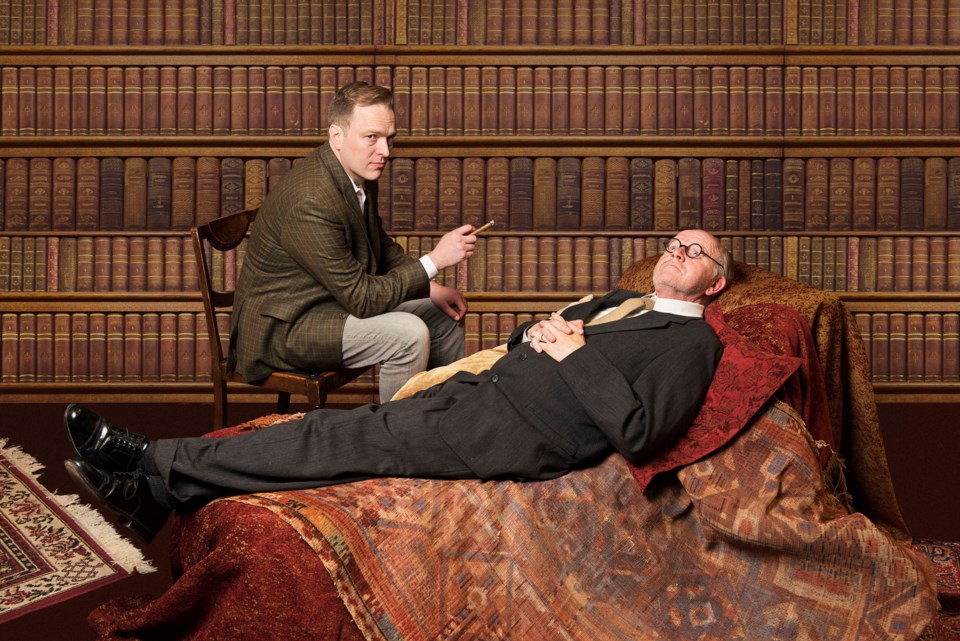Sigmund Freud was the father of psychoanalysis and one of the foremost atheists of the 20th century.
CS Lewis, author of the Chronicles of Narnia series, was one of its most celebrated Christian apologists.
As bombs start dropping and Britain descends into the Second World War, Freud – battling advanced cancer – contemplates ending his own life. Before making his decision, however, he pays a hypothetical visit to Lewis – imagined in all its repartee by Mark St. Germain in the off-Broadway hit Freud’s Last Session – to debate love, sex, the existence of God and the meaning of life.
As the two men explore these fundamental questions of humanity, audiences are witness to surprising emotional revelations and brilliantly opposing world views.
We caught up with Pacific Theatre artistic director, actor, and CS Lewis enthusiast Ron Reed to learn more about their staging of this famous meeting of the minds:
This play tackles a lot of subjects – assisted suicide, God, love – that people still debate today. How did the creator, Mark St. Germain, imagine that these two people would discuss these topics?
It’s fascinating. It actually originated in a Harvard University course seminar, and that led to a book and a PBS special about Freud and Lewis. During World War II, Lewis was on BBC [radio] giving talks about the Christian faith, and they say he was the second-most recognized voice in all of England. Second only to Churchill.
Wow. Was he putting the war in perspective with Christianity?
In most talks it wasn’t directly about the war, but the reason for the broadcast and the whole context was all these young men going off to war and facing their own deaths. And all their families. And indeed, in London, the bombing began fairly early in the war, so experiencing death firsthand.
So this Harvard professor chose Lewis and Freud – two of the most well-written men and most-documented (we know day-to-day their lives through journals and letters) – to put forward these profound questions about life and death, the nature of God and the existence of God, the arguments for and against that.
And then the playwright was intrigued by this dialectic, this battle of two great minds and souls, and said, 'What if I had the two men actually encounter each other and have this conversation?'
Does the play take actual words and writings from these men? Or does it imagine those as well.
It does imagine them. I’m much more conversant with Lewis – I’m writing a play about Lewis right now – but he uses many of the ideas and phrases and thoughts of the two men.
It's interesting...On the same stage 10 years ago, this director, Morris Ertman, directed me when I played CS Lewis in Shadowlands. In it, Lewis’ wife dies of cancer, and here we have Freud, 20 years earlier in this imagined meeting, who is dying of cancer. And Shadowlands begins with Lewis giving a talk on love, pain, and suffering. It was a central question in Lewis’ life. He fought in World War I, he lived through World War II, he lost his mother at an early age, he lost his wife to cancer late in life, so these questions were front and centre.
In the play, how does Lewis handle being confronted by Freud’s ideas?
It’s quite wonderful. Lewis would be just over 40 when the play happens – the 3rd of September, 1939; just as Chamberlain comes on the radio and announces England is now at war with Germany. And, as it happens, that is three weeks before Freud has his physician help him take his own life.
So Lewis is just over 40 years old, not a young man anymore, and yet Lewis has basically published only one book. And Freud has published a bookshelf full of books. Lewis is not well known, there’s no fame to this man yet. He’s a brilliant professor at Oxford and has been for a decade and a half at this point. So Lewis really comes in as the "younger" man against this formidable, famous, acclaimed man.
And how does he fare?
In the invented world of the play, Freud has contacted Lewis to say, 'Will you come and meet with me in my study in London?" Meanwhile Lewis has written condescendingly, negatively about Freud in his book, Pilgrim’s Regress. So Lewis thinks Freud is going to take a piece out of him. But Freud comes in and says, ‘How could you have shared my convictions that there is no God – Lewis was formerly an atheist – and abandon truth to embrace an insidious lie?’
So really Lewis is called on to make a case for his faith, his beliefs and his life, with Freud arguing every step of the way.
Why this play?
When I read the play a few years ago I thought it was fairly clinical and academic, just these two guys talking about ideas. I wasn’t going to do it, but I talked to someone on our board of directors who saw the play in New York, and he said, ‘Oh no, I cried, I wept, by the end of the play.’ And I said, ‘Really?? Well then, we’ll do it!’
And now, days into rehearsal, this is more than just an intellectual conversation. When you know that Freud is three weeks away from ending his own life, it is incredibly intense. These are not abstract ideas. This is a man who has chosen not only to not believe in God, but to argue against it, now facing his own pain and suffering and death, and taking one last crack at it. Saying, ‘Do your best shot. Is there anything there?...'
• Freud’s Last Session is the final show of Pacific Theatre’s regular season. It runs April 24-May 30. Tickets are $31.50/$21 and available here.


